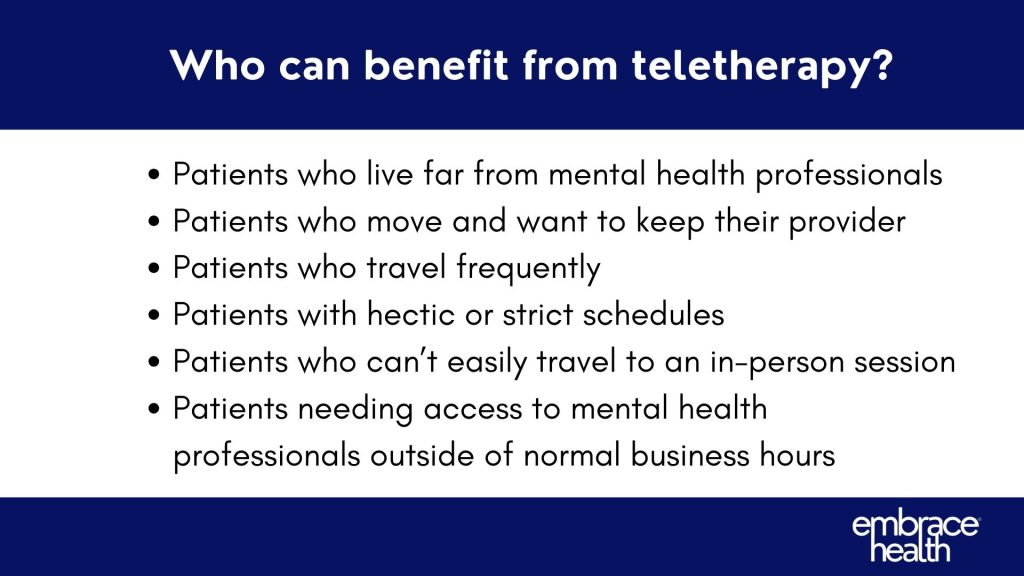Trying to decide if teletherapy, or online therapy, is right for you? There are several factors to consider as you weigh the pros and cons of connecting with a therapist on your phone or computer. The biggest considerations for most people are cost and convenience. With the click of a mouse or the tap of an app, you can access the services of a mental health professional.
Who’s Using Teletherapy?
An estimated 21% of U.S. adults used teletherapy within the last year, according to a survey from YouGov for Forbes Health. More than 60% of people who tried teletherapy found it to be effective. However, it appears that younger adults are more likely to use teletherapy than those over the age of 40. The YouGov survey found that 38% of millennials said they’ve used teletherapy services compared to just 16% of Gen X and only 10% of baby boomers.
A poll of U.S. adults in 2021 by the American Psychiatric Association found that nearly six in 10 Americans said they would use telehealth services for mental healthcare. Young adults (18 to 29) were twice as likely to use teletherapy. A majority of Americans said they were receptive to using a support line or online chat during a mental health challenge. More than 75% of U.S. hospitals connect with patients through video conferencing or other technology, according to the American Hospital Association.

Benefits of Teletherapy
Most healthcare experts believe teletherapy and telepsychiatry can be just as effective as in-person treatment, and typically costs much less. Researchers continue to evaluate the effectiveness of teletherapy and telepsychiatry compared to in-person or in-office sessions. Most people who’ve tried teletherapy say it was helpful. Here are some of the biggest benefits of teletherapy.
Convenience
Meeting with a therapist or psychiatric provider through video conferencing or a phone call is much more convenient than having to travel to their office. In many cases, online therapy comes with more flexible scheduling options for both mental health providers and patients. Teletherapy is a good option for parents who can’t find childcare, or people with strict work schedules who don’t have the time to travel to an in-person session. It’s also a better option for those who don’t have a vehicle or want to save money on transportation costs.
Individuals with mobility issues, whether permanent or temporary, may struggle to reach a therapist’s office. Teletherapy offers the flexibility to meet with a provider, regardless of these challenges.
Privacy
Online therapy, or teletherapy, offers more privacy than in-person alternatives. Being able to connect with a mental health provider at your home, or in your car, means you don’t have to worry about anyone seeing you in a waiting room. You won’t have to explain to anyone that you need to take time off work to go to therapy.
Cost
While many therapists charge their clients the same amount, whether a session takes place in person or online, other factors make virtual therapy less expensive. First, it removes transportation costs. And because you don’t have to travel to a therapist’s office, you save time, which in many cases means you save money.
Most insurance plans offer the same coverage for virtual and in-person therapy.
Continuity and Consistency
Consistency in therapy is vital, especially for techniques like cognitive behavioral therapy (CBT). Teletherapy helps ensure your mental health treatment can continue without disruptions, safeguarding the effectiveness of the therapeutic process.
Access
Teletherapy is especially helpful for those living in rural areas, or far distances from mental health providers. Because the overall cost of online therapy is typically less than in-person therapy it’s a good option for those facing economic challenges. Virtual therapy typically allows patients to choose their method of connection, such as a phone call, video chat, text or participating in group therapy sessions.
Teletherapy has transformed mental healthcare accessibility and effectiveness. For individuals who fall into any of the categories mentioned in this article, teletherapy offers a compelling solution to access the care they need, when they need it. It’s safe, effective, and capable of making mental health specialty care more accessible to everyone. If you find yourself in one of these categories, consider teletherapy as a means to empower your mental health journey.

Is Teletherapy Right for You?
Teletherapy, or online counseling, has emerged as a valuable solution for many, providing a range of benefits. However, before you schedule your first teletherapy appointment, it’s essential to consider whether it’s the right fit for your specific needs. Here are some key factors to keep in mind as you evaluate whether teletherapy is suitable for you:
1. Are You Covered?
While teletherapy offers numerous advantages, it’s important to check if your insurance plan covers or partially reimburses teletherapy services. Some insurance providers may not fully support online counseling, which could result in high out-of-pocket expenses, especially if you require ongoing therapy. Fortunately, as teletherapy gains popularity, more insurance companies are likely to expand their coverage to include these services. New laws force insurance companies to provide teletherapy coverage.
2. Therapist-Client Relationship
One crucial aspect of therapy is the relationship between the therapist and the client. For some individuals, establishing a connection with their therapist through phone or video may not feel the same as an in-person experience. It’s essential to consider whether you are comfortable with this online dynamic and if it aligns with your preferences and needs. The therapeutic relationship plays a pivotal role in the success of your therapy, making it a vital consideration.
3. May Not Be Right For All Problems
Teletherapy may not be suitable for all types of mental health issues. If you’re dealing with severe problems, such as suicidal thoughts, teletherapy may not be the best option. Assessing a person’s condition accurately can be more challenging when the therapist is not physically present. Additionally, during crises, counselors often prefer to provide in-person support.
Moreover, specific types of therapy, like exposure therapy, can be challenging to administer remotely. Therefore, the nature of your mental health concerns and the type of therapy you need are critical factors in deciding if teletherapy is appropriate.
4. Suitability for Different Client Profiles
Telehealth services may not be a one-size-fits-all solution. They may be less suitable for clients who are severely mentally ill or those who pose a danger to themselves or others. Teletherapy tends to work best for relatively self-reliant clients, who can access additional resources when needed, possess the self-discipline to complete out-of-session homework or tasks, and understand the risks and limitations associated with telehealth.
It’s important to recognize that teletherapy is different from traditional in-person mental health treatment. The absence of face-to-face interaction may limit the therapist’s ability to read body language and nonverbal cues. However, teletherapy can still deliver consistent benefits, helping you understand, recognize, and address the daily mental health challenges you face.
Ultimately, the decision to engage in teletherapy should be based on your individual needs and circumstances. It’s a powerful and accessible tool, but its effectiveness depends on how well it aligns with your unique requirements and preferences. Careful consideration of these factors will help you determine if teletherapy is the right choice for you on your path to better mental health. Whether you’re ready to book an appointment or need more information about teletherapy, we can help.


